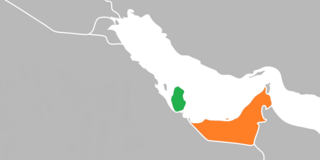
The United Arab Emirates (UAE), or simply the Emirates, is a country in West Asia, in the Middle East, at the eastern end of the Arabian Peninsula. It is a federal elective monarchy made up of seven emirates, with Abu Dhabi serving as its capital. It shares land borders with Oman to the east and northeast, and with Saudi Arabia to the southwest; as well as maritime borders in the Persian Gulf with Qatar and Iran, and with Oman in the Gulf of Oman. As of 2024, the UAE has an estimated population of over 10 million, of which 11% are Emiratis; Dubai is its most populous city and is an international hub. Islam is the official religion and Arabic is the official language, while English is the most spoken language and the language of business.

Willard Tobe Hooper was an American filmmaker, best known for his work in the horror genre. The British Film Institute cited Hooper as one of the most influential horror filmmakers of all time.

The Emirate of Fujairah is one of the seven emirates that make up the United Arab Emirates, the only one of the seven with a coastline solely on the Gulf of Oman and none on the Persian Gulf. Its capital is Fujairah.

Sheikh Mohamed bin Zayed bin Sultan Al Nahyan, also known as MbZ, is an Emirati royal and politician who is serving as the third and current president of the United Arab Emirates and ruler of Abu Dhabi since 2022.

Cinema of the United Arab Emirates began with a number of feature films that were broadcast on national television since the late 1980s.

The culture of the United Arab Emirates is part of the culture of Eastern Arabia. Its historical population was a small tribal community that changed with the arrival of an influx of foreign nationals in the mid-20th century. Emirati culture is a blend of Arabian, Islamic, and Persian cultures, with influences from the cultures of East Africa and Indian Subcontinent. Islam has had a prominent influence on local architecture, music, attire, cuisine, and lifestyle.

The Abu Dhabi Film Festival, formerly the Middle East International Film Festival (MEIFF), was an international film festival held in the city of Abu Dhabi, United Arab Emirates from 2007 to 2015.

Abu Dhabi Media Network is the official media organization of the Government of Abu Dhabi. The organization was established in 2007.

Sheikh Hamdan bin Zayed bin Sultan Al Nahyan is an Emirati royal and politician. He is the ruler's representative in Al Dhafrah region of Abu Dhabi. Sheikh Hamdan is a son of the late Zayed bin Sultan Al Nahyan, President of the United Arab Emirates and Emir of Abu Dhabi. Hamdan is the younger brother of both former UAE president Khalifa bin Zayed and the current president, Mohamed bin Zayed.
Ousha bint Khalifa Al Suwaidi also known as Fatat Al-Arab, Ousha Al Sha'er was an Emirati poet. She is regarded as among the finest Arabic Nabati poets.

Canada and the United Arab Emirates established diplomatic relations in 1974. Each maintains an embassy in the other's capital.

Relations exist between the United Arab Emirates and Bahrain. Relations between the two countries are close and friendly, with the U.A.E. having an embassy in Manama while Bahrain maintains its embassy in Abu Dhabi. Both states are geographically a part of the Persian Gulf and lie in close proximity to one another; both are also members of the Gulf Cooperation Council (GCC).

Qatar and the United Arab Emirates share a naval border and are part of the Arabic-speaking Persian Gulf region. They are both members of the GCC.
Sheikh Hamed bin Zayed Al Nahyan is an Emirati businessman and managing director of Abu Dhabi Investment Authority. He is a member of the Al Nahyan, ruling family of Abu Dhabi.
Image Nation Abu Dhabi,, is an Emirati film studio established in 2008. It is based at twofour54’s Yas Creative Hub in Abu Dhabi, United Arab Emirates. The studio focuses on creating films, TV series, documentaries, and entertainment content, becoming the first UAE company to have multiple productions stream on Netflix. The studio's productions have been screened at over 400 international film festivals and have received prestigious awards, including two Academy Awards, a BAFTA, and an Emmy. Image Nation is a subdivision of Creative Media Authority.

Sea Shadow is a 2011 Emirati coming-of-age film written by Mohammed Hassan Ahmed and directed by Nawaf Al-Janahi. The film was the first from Image Nation to be filmed in the United Arab Emirates. The film premiered at the Abu Dhabi Film Festival in October 2011 and was released in theaters throughout the Arab states of the Persian Gulf in November 2011. It premiered in the United States at the Palm Springs International Film Festival in January 2012.
Nayla Al Khaja is the first female screenwriter, director, and producer in the United Arab Emirates.
Mattar Bin Lahej is an Emirati painter, photographer and sculptor from Dubai. He founded Marsam Mattar, the first art gallery in the United Arab Emirates to be managed by an artist. Bin Lahej is also the artist and calligrapher behind the facade on the museum of the future, making it one of the most prominent buildings and structures in Dubai and is described as "the only building that speaks Arabic"

Going to Heaven is a 2015 Emirati film directed by Saeed Salmeen Al-Murry, Produced by Amer Salmeen and starring Jumaa Ibrahim Al Zaabi, Ahmed Ibrahim Al Zaabi, Fatima Al Taei, Mariam Sultan and Abdullah Masood. Its plot is set in the United Arab Emirates. The story is about a young 11 years old boy called Sultan who travels from Abu Dhabi to Fujairah with his best friend, Saud, to reunite with his maternal, far gone grandmother, who is estranged from the family.














